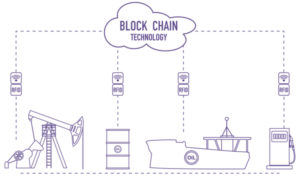
Operations Management? When I was at Babson College one of our core curriculum courses was Operations Management. And, at the time, I didn’t see the vast opportunities that would unfold from this course.
Who wants to spend a career figuring out how to piece together a supply chain or re-tool a factory?
Then, when I had an internship at an online grocery delivery start-up, I recognized how fruitful a career in Ops could actually be.
Fast forward to today and if you’re an Ops wizard, companies like Walmart or Amazon want to talk with you.
Sometimes it’s hard to see the forest through the trees.
Over the weekend, I read Babson Magazine and the article “Get to Know Blockchain,” which instantly reminded me of my experience with Operations Management and perhaps the vast opportunities we have yet to experience with blockchain.
Hey, if you want to track the origin of that romaine lettuce in your Caesar salad, you might be able to do it. The revolution in blockchain is coming. Stay tuned.
Donna Coco writes at Babson Magazine:
Perhaps one of the most publicized applications is in the food industry, with Walmart and reportedly 10 other large companies working together to create a blockchain that tracks their food supply chains. IBM is providing the technology and calls the initiative the IBM Food Trust. An important goal—in addition to improved transparency, standards, and record keeping—is better handling of food recalls. Because blockchain would capture data along all points of the supply chain, it would allow for quick identification and tracking of problems. Faster recalls of unsafe foods should benefit not only consumers but companies, too, because they can avoid the often huge losses associated with these recalls.
“What happens now is someone says the romaine lettuce is tainted, and suddenly everyone across all of the Western part of the United States is throwing out romaine lettuce,” says Rachel Greenberger, MBA’11, adjunct lecturer and director of Food Sol at Babson. “Blockchain lets a company immediately find out which farm or pool of romaine lettuce in a specific area is contaminated and recall that product, leaving everybody else alone.”
Greenberger believes the potential for blockchain to change the way the food industry functions—improving methods for proof of provenance, increasing safety and efficiency, reducing waste—is enormous. Although she says it’s still too early to know exactly how blockchain will play out, Greenberger thinks it will be adopted quickly if there is money to be made. “Right now, there are still a lot of fax machines and paper and human error. We have one of the safest food supply chains in the world, and yet there are a lot of gaps in its management,” she says. “If a giant company, like Walmart, for example, adopts blockchain, then because of its size and command over the industry, many smaller players will have to get on the Walmart chain as well.”
Entrepreneurs in the food industry should be learning about blockchain and watching its evolution, she continues. “If this gets adopted by major players in the food industry who call the shots on how everything else comes down, then if you want to sell to them, you will have to be thinking about blockchain as part of the way that you move and share data,” Greenberger says. “It’s early. There are not enough cases in the food industry yet. But I tell entrepreneurs to keep on this. It could change everything. You need to know it.”
Read more here.
Inspired by George Gilder’s Life after Google, my series Cryptocosm and Life After Google has been discussing how blockchain technologies will affect business in the near future. Read the whole series here.
Originally posted on Your Survival Guy.




